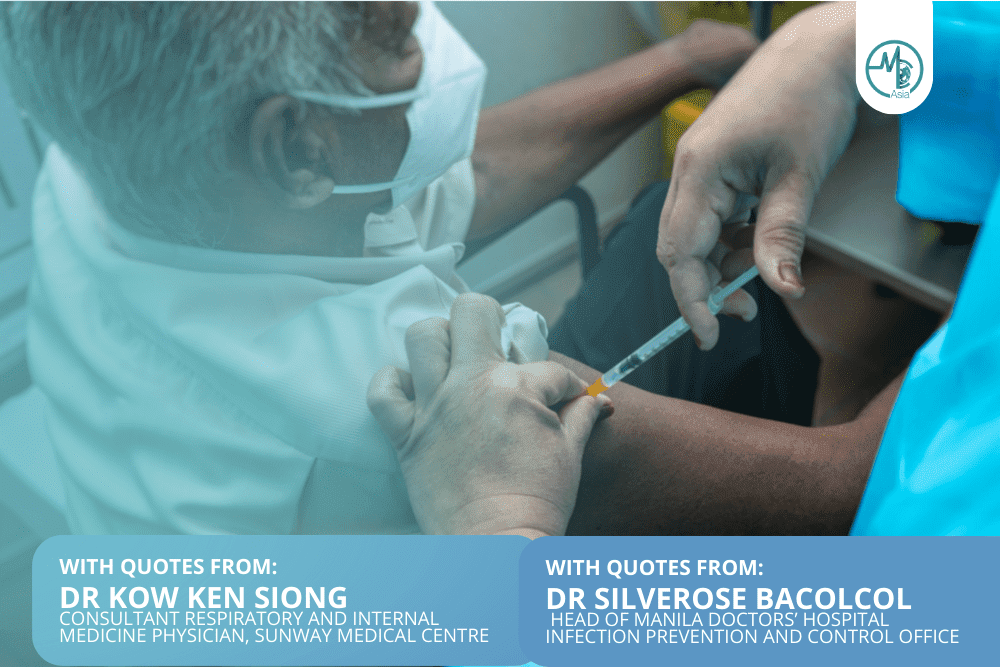As COVID-19 cases surge again in Southeast Asia, we speak with medical experts across the sub-continent to get their thoughts on getting a booster shot for added protection.
Waning Immunity and Rise in Cases
Around the 12-month point, protection against severe COVID-19 drops, emphasised Singapore Health Minister Ong Ye Kung. To prevent severe illness, high-risk individuals need annual jabs. Singapore is in the midst of another COVID-19 wave. Daily cases jumped from 1,000 to 2,000 in recent weeks. The EG.5 and HK.3 variants, descendants of XBB Omicron, account for over 75% of cases. However, Singapore has no plans for new social restrictions. Health Minister Ong confirmed the population has become more resilient, thanks to vaccines and recoveries. This is despite the presence of the virus and its potency.
Recent data reveals a severe illness rate of 10 per 100,000 for those well-protected (with three mRNA shots and a past recovery). In contrast, those without any protection face a rate of over 50 per 100,000. This is five times higher than the vaccinated population. If it has been over 12 months since receiving three mRNA shots and a past infection, the protection is akin to the unprotected. Protection diminishes around the 12-month period.
Philippine Expert Weigh In
Dr Silverose Ann Bacolcol, Head of Manila Doctors’ Hospital Infection Prevention and Control Office, shared that “Most of the COVID-19 cases we see now are mild to moderate infections and can be managed at home. However, patients who have risk factors for disease progression, such as the elderly, those with co-morbid conditions, and are immunocompromised, need close monitoring and may have to be admitted.”
Dr Bacolcol strongly advised to receive a booster shot. She stated, “People should still receive their booster shots for COVID-19. This is because the threat of COVID-19 infection still exists and will continue to stay. The US CDC and Philippine DOH recommend the COVID-19 booster to prevent serious illness, hospitalisation, and death due to COVID-19.” About 23 million Filipinos have received a booster shot.
Insights from Malaysian Respiratory Physician
Meanwhile, Dr Kow Ken Siong, Consultant Respiratory and Internal Medicine Physician at Sunway Medical Centre, Sunway City, is concerned about the social and long-term health impact on the rise in COVID-19 cases. He stated,” An increase in incidences of communicable and infectious diseases like COVID-19 generally affects society and the populations in various important aspects. These are namely socioeconomically through days off work as well as decreased productivity, not to mention overwhelming the healthcare facilities.”
Dr Kow continued, “Increase in cases also affects the patients at an individual level by increasing morbidity and mortality. This particularly affects the very young or the elderly and the immunocompromised with coexisting premorbid conditions that confer an increased likelihood of more severe and protracted disease. This may result in long-term and permanent health sequelae if they survive the illness.”
Monovalent Vaccines in Singapore
In Singapore, doctors suggest that the general population wait for the new monovalent vaccines, which target the current XBB.1.5 strain. The new booster vaccines should be available within the following weeks. However, Associate Professor Lim Poh Lian of the National Centre for Infectious Diseases urged at-risk groups to get the booster shot now “to be protected by strengthening their immunity”.
Conclusion
As Asia grapples with evolving variants and surges, experts agree on the importance of boosters. They not only renew protection but also ensure adaptability against newer variants. Staying informed and proactive is the key to navigating this pandemic.

